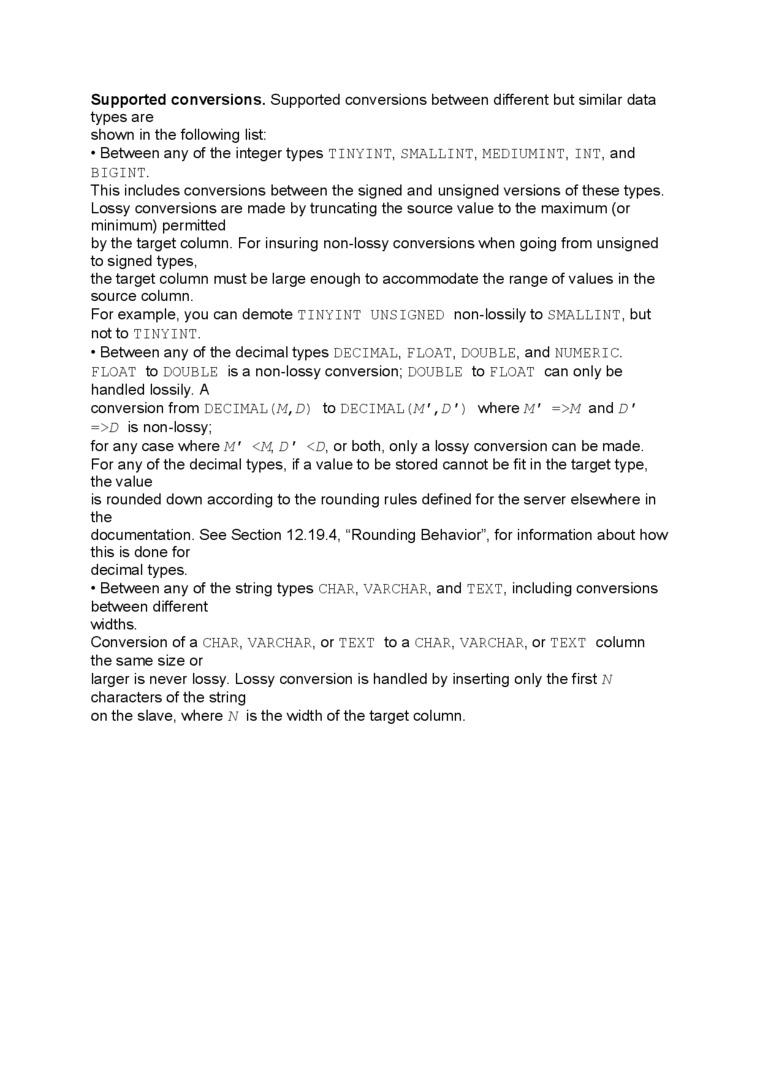89537

Supported corwersions. Supported conversions between different but similar data types are
shown in the following list:
• Between any of the integer types TINYINT, SMALLINT, MEDIUMINT, INT, and BIGINT.
This includes conversions between the signed and unsigned versions of these types. Lossy conversions are madę by truncating the source value to the maximum (or minimum) permitted
by the target column. For insuring non-lossy conversions when going from unsigned to signed types,
the target column must be large enough to accommodate the rangę of values in the source column.
For example, you can demote TINYINT UNSIGNED non-lossily to SMALLINT, but not to TINYINT.
• Between any of the decimal types DECIMAL, FLOAT, DOUBLE, and NUMERIC.
FLOAT to DOUBLE is a non-lossy conversion; DOUBLE to FLOAT can only be handled lossily. A
conversion from DEC IMAŁ {M,D) to DECIMAL [M' ,D') where M' =>M andD'
=>D is non-lossy;
for any case where M' <M,D' <D, or both, only a lossy conversion can be madę.
For any of the decimal types, if a value to be stored cannot be fit in the target type, the value
is rounded down according to the rounding rules defined for the server elsewhere in the
documentation. See Section 12.19.4, “Rounding Behavior", for information about how this is done for decimal types.
• Between any of the string types CHAR, VARCHAR, and TEXT, including conversions between different
widths.
Conversion of a CHAR, VARCHAR, or TEXT to a CHAR, VARCHAR, or TEXT column the same size or
larger is never lossy. Lossy conversion is handled by inserting only the first N characters of the string
on the slave, where N is the width of the target column.
Wyszukiwarka
Podobne podstrony:
CCF20091103�002 5. THE DIFFERENCE BETWEEN MAIN THOUGHT AND KEYSENTENCE You are familiar with the fac
CSG294 283 Prepositions The “personal a” (different from the preposition a) is reąuired in the follo
Replication of Columns Having Different Data Types Corresponding columns on the master s and the sla
II3-5 Absorption calculations are shown in Figurę 7 for two different temperatures and optical depth
compensation-rekompensata Competition-rivalry between businesses that are operating in the same mark
m85@ examples of these are illustrated in the tapestry but it is not possible to interpret the
page1 (38) Do you remember łhe mony conversations you held wilh your customcrs ond ołhor interested
CSG294 283 Prepositions The “personal a” (different from the preposition a) is reąuired in the follo
page1 (38) Do you remember łhe mony conversations you held wilh your customcrs ond ołhor interested
memcached Hashing/Distribution Types The memcached Client interface supports a number of different
00381 ?c79f45a4235fae8108ab837f609112 385 Regret Indices and Capability Quantification Figurę 11. C
2013 SYSTEMS SUPPORTING PRODUCTION ENGEINEERING 3. Berguer R.: Ergonomics in the
sieroctwo 268 SIEROCTWO barino J., Social support networks: informal hełping in the human services&g
SERVICE BLUEPRINT 101 A diagram that visualizes the relationships between different service componen
więcej podobnych podstron